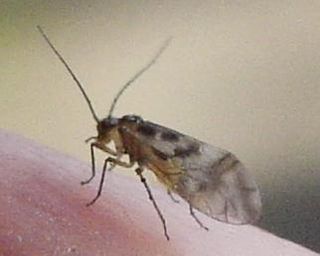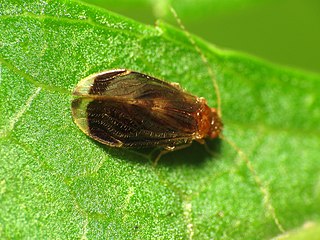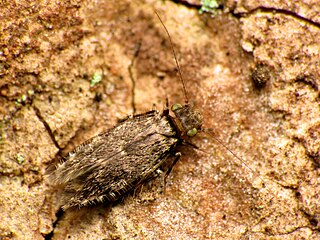
Psocoptera are an order of insects that are commonly known as booklice, barklice or barkflies. They first appeared in the Permian period, 295–248 million years ago. They are often regarded as the most primitive of the hemipteroids. Their name originates from the Greek word ψῶχος, psokhos meaning gnawed or rubbed and πτερά, ptera meaning wings. There are more than 5,500 species in 41 families in three suborders. Many of these species have only been described in recent years.

Psocomorpha is a suborder of barklice, booklice, and parasitic lice in the order Psocoptera. There are more than 20 families and 5,300 described species in Psocomorpha.

Amphipsocidae is a family of hairy-winged barklice in the order Psocoptera. Most species are 3.0-4.5 mm long and have many setae (hairs) on the veins and margin of the forewing. The main veins of the forewing are usually lined with two rows of setae. Like the other members of the infra-order Caeciliusetae, they have a broad, flat labrum, with well defined edges.

Peripsocidae is a family of Psocoptera belonging to the suborder Psocomorpha. Members of the family are characterised by their absence of an areola postica in their wings. Many of the recently described genera are closely allied to Peripsocus. The family includes more than 300 species.

Ectopsocidae is a family of Psocoptera belonging to the suborder Psocomorpha. Members of the family are characterised by their absence of an areola postica in their wings, like in the family Peripsocidae. The family includes fewer than 200 species, most of them in the genus Ectopsocus.

Homilopscocidea is an infraorder of Psocoptera. It is probably a paraphyletic group, still in use for lack of a better solution. There are about 7 families and more than 1,200 described species in Homilopsocidea.

Lepidopsocidae are an insect family of bark lice (Psocoptera) belonging to the suborder Trogiomorpha. Colloquially, Lepidopsocidae are referred to as the Scaly-winged Barklice. There are more than 220 species described worldwide. Phylogenetic analysis of relationships between families in Trogiomorpha, based on partial sequences of the nuclear 18S rDNA, mitochondrial 16S rDNA, and Histone 3 genes, propose that Lepidopsocidae is monophyletic, meaning that the taxa within share a common ancestor. This is supported morphologically by the presence of scales and setae covering the body and forewings of Lepodopsocids. Sister families of Lepidoposcidae include Trogiidae and Psoquillidae.

Liposcelis is a genus of insects in the order Psocoptera, the booklice and barklice. There are about 126 species. Many species are associated with human habitation and several are well known as pests of stored products. The genus is distributed nearly worldwide.
Ectopsocus meridionalis is a species of outer barklouse in the family Ectopsocidae. It is found in Africa, the Caribbean, Europe & Northern Asia, Central America, North America, Oceania, South America, and Southern Asia.

Epipsocetae is an infraorder of psocids in the order Psocoptera. There are about 5 families and more than 480 described species in Epipsocetae.

Lachesilla texana is a species of fateful barklouse in the family Lachesillidae.

Ptyctini is a tribe of common barklice in the family Psocidae. There are about 6 genera and at least 20 described species in Ptyctini.

Psocinae is a subfamily of common barklice in the family Psocidae. There are about 11 genera and at least 40 described species in Psocinae.
Soa is a genus of scaly-winged barklice in the family Lepidopsocidae. There are about six described species in Soa.
Aaroniella badonneli is a species of loving barklouse in the family Philotarsidae. It is found in Europe, Northern Asia, as well as Canada and the United States.

Paracaeciliidae is a family of bark lice in the order Psocodea. There are about 5 genera and more than 100 described species in Paracaeciliidae.
Sabulopsocidae is a family of lice in the order Psocodea. There are at least two genera and two described species in Sabulopsocidae.
Spurostigmatidae is a family of lice in the order Psocodea. There is at least one genus, Spurostigma, in Spurostigmatidae.

Nanopsocetae is an infraorder of psocids in the order Psocoptera. There are more than 20 families and 5,200 described species in Nanopsocetae.












